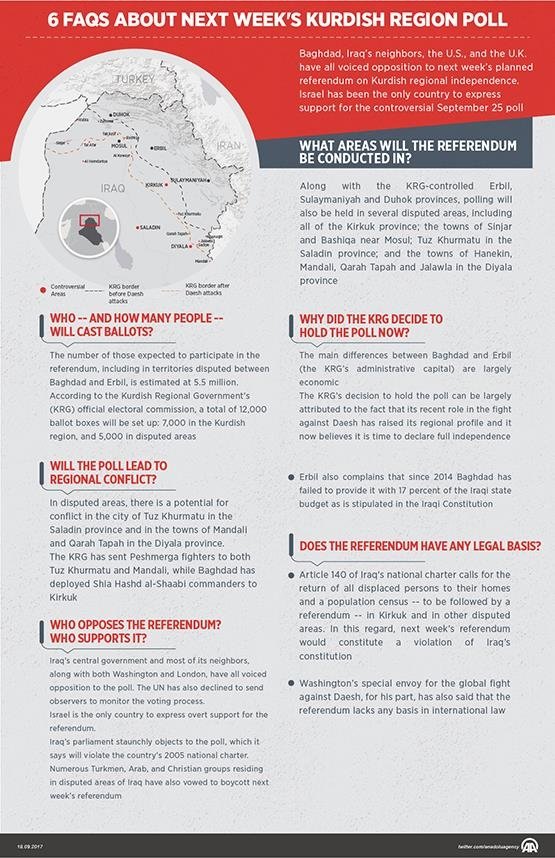Baghdad, Iraq's neighbors, the U.S., and the U.K. have all voiced opposition to next week's planned referendum on Kurdish regional independence. Israel has been the only country to express support for the controversial Sept. 25 poll.
The following are some frequently asked questions about the upcoming referendum, which will see residents of northern Iraq's Kurdish region vote on whether or not to declare independence from Baghdad.

Who -- and how many people -- will cast ballots?
The number of those expected to participate in the referendum, including in territories disputed between Baghdad and Erbil, is estimated at 5.5 million.
According to the Kurdish Regional Government's (KRG) official electoral commission, a total of 12,000 ballot boxes will be set up: 7,000 in the Kurdish region, and 5,000 in disputed areas.
Will the poll lead to regional conflict?
In disputed areas, there is a potential for conflict in the city of Tuz Khurmatu in the Saladin province and in the towns of Mandali and Qarah Tapah in the Diyala province.
The KRG has sent Peshmerga fighters to both Tuz Khurmatu and Mandali, while Baghdad has deployed Shia Hashd al-Shaabi commanders to Kirkuk.
Who opposes the referendum? Who supports it?
Iraq's central government and most of its neighbors, along with both Washington and London, have all voiced opposition to the poll. The UN has also declined to send observers to monitor the voting process.
Israel is the only country to express overt support for the referendum.
Iraq's parliament staunchly objects to the poll, which it says will violate the country's 2005 national charter.
Numerous Turkmen, Arab, and Christian groups residing in disputed areas of Iraq have also vowed to boycott next week's referendum.
What areas will the referendum be conducted in?
Along with the KRG-controlled Erbil, Sulaymaniyah and Duhok provinces, polling will also be held in several disputed areas, including all of the Kirkuk province; the towns of Sinjar and Bashiqa near Mosul; Tuz Khurmatu in the Saladin province; and the towns of Hanekin, Mandali, Qarah Tapah and Jalawla in the Diyala province.
Why did the KRG decide to hold the poll now?
The main differences between Baghdad and Erbil (the KRG's administrative capital) are largely economic.
The KRG's decision to hold the poll can be largely attributed to the fact that its recent role in the fight against Daesh has raised its regional profile and it now believes it is time to declare full independence.
Erbil also complains that since 2014 Baghdad has failed to provide it with 17 percent of the Iraqi state budget as is stipulated in the Iraqi Constitution.
Does the referendum have any legal basis?
Article 140 of Iraq's national charter calls for the return of all displaced persons to their homes and a population census -- to be followed by a referendum -- in Kirkuk and in other disputed areas. In this regard, next week's referendum would constitute a violation of Iraq's constitution.
Washington's special envoy for the global fight against Daesh, for his part, has also said that the referendum lacks any basis in international law.